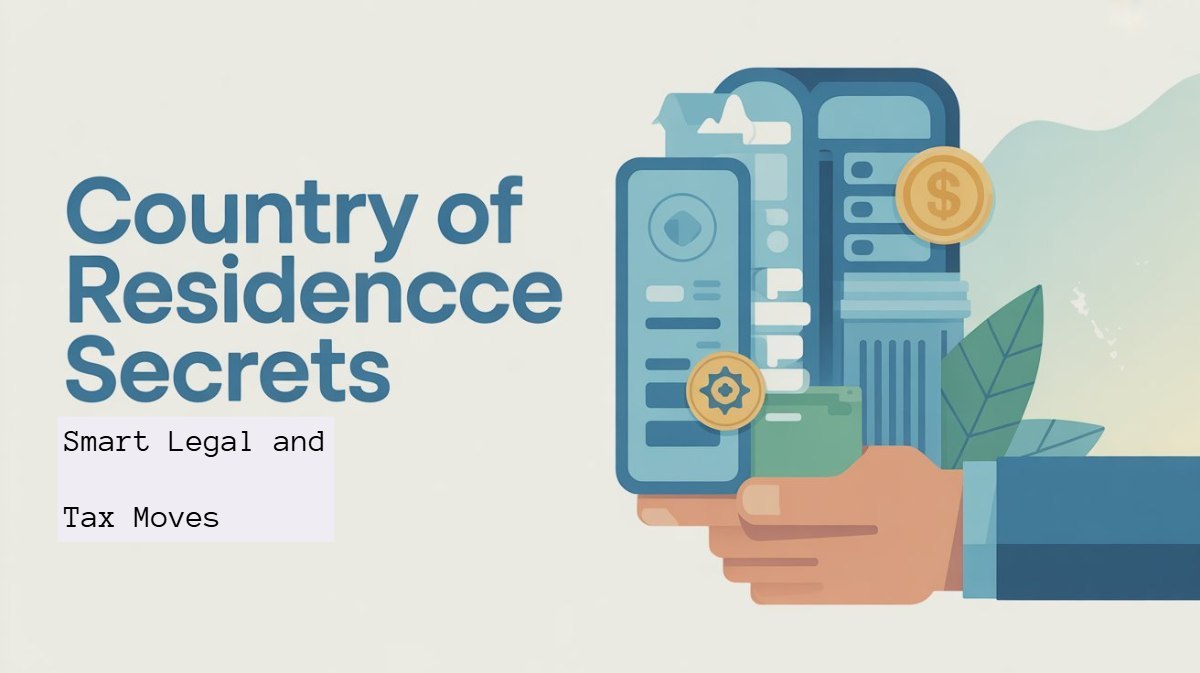Your Country of Residence is more than just the place where you live—it defines your tax obligations, legal rights, financial stability, and immigration status. In today’s interconnected world, understanding this concept is no longer optional but essential, especially for expatriates, digital nomads, global investors, and retirees moving abroad.
Many people assume that nationality and residence are the same, but legally, they are very different. A wrong assumption about your Country of Residence can lead to double taxation, visa rejections, inheritance disputes, and even legal penalties.
In this guide, we’ll uncover the secrets of the Country of Residence, explain how it impacts taxation and legal matters, highlight common mistakes people make, and share innovative strategies to manage your status effectively in 2025 and beyond.
Why Understanding Your Country of Residence Matters
Knowing your Country of Residence is critical for:
- Legal Compliance – It defines which nation’s laws apply to your contracts, inheritance, and family matters.
- Tax Responsibility – It defines where you pay income, property, and capital gains tax.
- Immigration Status – It affects your visa, residency permit, or citizenship applications.
- Financial Planning – It influences banking, investments, and estate planning.
Your Country of Residence is the nation where you live most of the time and maintain economic, social, or legal ties. It determines your tax obligations, visa eligibility, and legal jurisdiction.
Key Factors That Determine Your Country of Residence

Different countries use different rules, but the following factors are the most important:
1. Physical Presence (183-Day Rule)
- Most nations use the 183-day rule. If you spend more than 183 days in a country within a tax year, you are usually considered a tax resident there.
- Example: The U.K., U.S. (Substantial Presence Test), and Canada follow this rule.
2. Permanent Address or Domicile
- Your domicile is your endless home country, even if you live abroad.
- Example: You may reside in Spain for tax purposes but maintain a U.K. domicile for inheritance law.
3. Employment or Economic Ties
- Where you work, earn income, or hold property can define your residency.
- Example: A Canadian resident working in Canada for most of the year will be treated as a tax resident, even if they travel abroad frequently.
4. Family and Social Ties
- If your spouse, children, or dependents live in a country, authorities may classify you as a resident there, even if you travel often.
5. Legal Documentation
- Residency permits, tax registration, and visas also serve as proof of your Country of Residence.
Difference Between Country of Residence, Nationality, and Domicile
| Term | Definition | Can It Change? | Example |
|---|---|---|---|
| Country of Residence | The nation where you live for an extended period and have legal/tax ties. | Yes, based on relocation. | A U.S. citizen living in Germany for work → Germany is the Country of Residence. |
| Nationality | Legal bond with a country (citizenship, passport). | Rarely (via naturalization). | A person born in Italy remains Italian even if living abroad. |
| Domicile | Permanent home country, tied to inheritance/tax laws. | Hard to change. | A Briton living in Spain but legally domiciled in the U.K. for inheritance tax. |
Real-Life Examples
Similarly, just as travelers research the Safest Countries in South America before relocating, understanding your Country of Residence helps you avoid legal and financial risks when moving abroad.
John – Expat Worker
- Consider John, an American software developer who moved to Germany.
- Since he spends more than 183 days there and earns his income locally, Germany becomes his Country of Residence, even though he holds U.S. nationality.
Emily – Retired Abroad
- Emily, a British retiree living in Spain for most of the year, is a Spanish resident for tax purposes but still maintains her U.K. domicile for inheritance matters.
These cases show how residency rules can vary depending on personal circumstances and also highlight why defining your Country of Residence correctly is crucial.
Legal Implications of Country of Residence

- Contracts & Business Deals – The jurisdiction of your contracts often depends on your residence.
- Inheritance Laws – Domicile vs. residence can affect how your estate is taxed.
- Family Matters – Custody, divorce, and adoption laws depend on where you reside.
- Court Jurisdiction – Courts usually assess cases based on your residency status.
Tax Implications of Country of Residence
Your Country of Residence decides where and how you pay taxes:
- Income Tax – Residents may be taxed on global income.
- Capital Gains Tax – Property sales abroad may still be taxed.
- Double Taxation – Living in multiple countries can trigger double taxation unless covered by treaties.
Example:
- A U.S. citizen residing in France must pay French taxes but also file a U.S. return. However, the U.S.-France tax treaty helps reduce double taxation.
Common Mistakes People Make
- Confusing nationality with residence on visa/tax forms.
- Ignoring the 183-day rule when living abroad.
- Failing to update bank and legal documents after moving.
- Not consulting a tax advisor before relocating.
How to Change Your Country of Residence (Step-by-Step)

To change your Country of Residence, first secure the proper visa or residency access in your new country and register with local authorities. Next, notify tax offices in both your old and new countries to avoid double taxation. Finally, update all legal, banking, and insurance documents to reflect your new residency status.
Move to a New Country
Get a residency permit or visa.
Register with local authorities.
Notify Tax Authorities
File an exit tax return in your old country.
Apply for tax residency in the new country.
Update Legal Documents
Update passports, bank accounts, and insurance policies.
Ensure health and pension systems reflect your new status.
Practical Tips to Manage Country of Residence
- Keep utility bills, rental agreements, and tax records as proof.
- Open a local bank account.
- Track your travel days to avoid breaking residency rules.
- Use tax treaties to avoid double taxation.
- Consult legal and tax experts before relocating.
Country of Residence vs. Domicile: Why It Counts
- Residence = Flexible, based on where you live now.
- Domicile = Permanent, tied to your identity and inheritance laws.
- Both determine how courts handle divorce, property disputes, and estate planning.
Financial Implications
- Banking – Non-resident accounts have restrictions and higher fees.
- Investments – Residency impacts taxation of dividends and property.
- Loans – Local banks often require proof of residency for mortgages.
Conclusion
Your Country of Residence is more than a technicality—it’s the basis of your legal identity, tax obligations, and financial freedom. Misunderstanding it can cost you time, money, and peace of mind. By staying informed, revising your documents, and consulting with professionals, you can use your Country of Residence as a strategic tool to minimize taxes, simplify immigration, and protect your assets.
At Litefacts, knowledge empowers smarter decisions. Understanding where you legally reside not only keeps you compliant but also gives you control over your future—helping you avoid costly mistakes and secure long-term financial stability.
Frequently Asked Questions (FAQ)
What is the 183-day rule for Country of Residence?
If you spend more than 183 days in a country in a tax year, you are considered a tax resident. This rule helps determine where your income will be taxed.
Can I have more than one Country of Residence?
Yes, it’s possible to have multiple residencies, but tax treaties decide which country is your primary residence for taxation.
How does my Country of Residence affect visas?
Your residency status impacts visa eligibility, and embassies often require proof of residence. Incorrect details may cause visa rejection.
Does living abroad change my tax obligations?
Yes, living abroad may shift your tax duties, but some countries, like the U.S., still require citizens to file taxes globally.
How do I officially change my Country of Residence?
Legally move, update your documents, and inform tax authorities. Establishing local ties confirms your new residency status.





